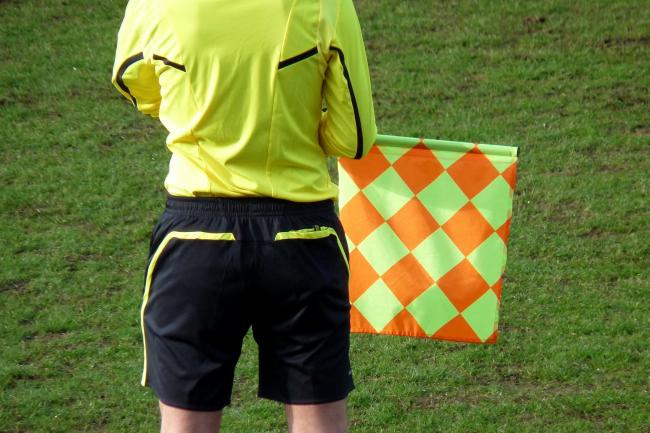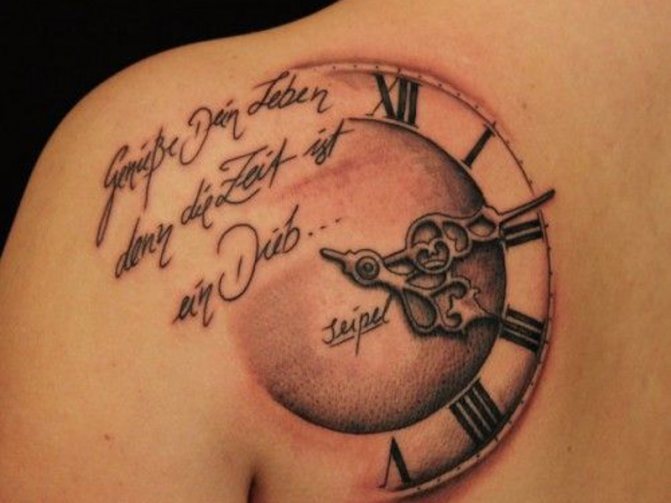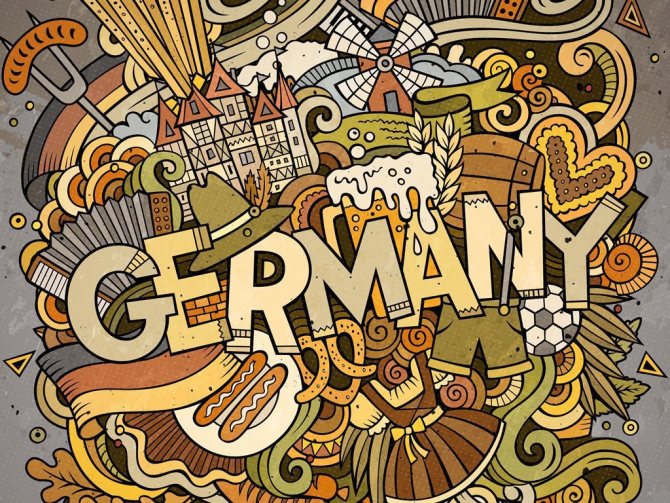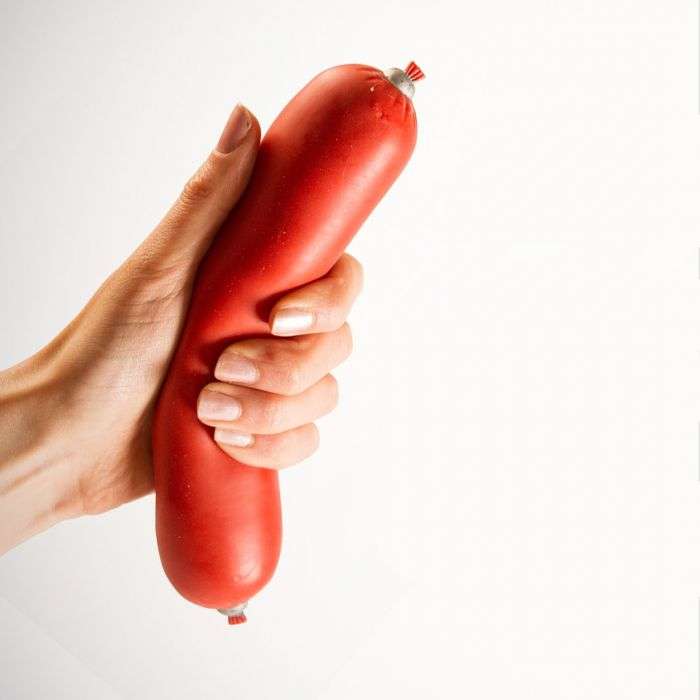You speak German well but you would like to impress your conversation partner? Do you love the language, its tones and tonality? Do you want to know it better and understand native speakers perfectly?
You can do this with the help of beautiful German expressions. Very often we just need to use such phrases, but it can be difficult to compose them on our own. Especially when it comes to some wise statement or a desire to express your feelings in an unconventional way. To simplify such tasks, we have compiled a selection of phrases for different situations.
Phrases in German for first contact
| In Russian | In German | How to read |
| Hello | Grüss Gott | Grüss Gott |
| Hi | Hallo | Halló: |
| Good morning | Guten Morgen | Gý:ten morgen |
| Good afternoon | Guten Tag | Gý:tön ta:k |
| Good evening | Guten Abend | Gý:tön á:bent |
| How was your trip? | Wie war Ihre Reise? | Wie wa:r ú:ré reise? |
| How was your/your trip? | Wie geht es Ihnen/ dir? | Wie g:et es ú:nen/ di:r? |
| Thank you, that's fine. | Danke, gut. | Danke, gu:t. |
| Do you speak Russian? | Sprechen Sie Russisch? | Sprechen sie rýsisch? |
| I speak Russian/English | Jch kann Russisch/Englisch | Ich kann Russisch/Englisch |
| I speak a little German. | Jch spreche etwas Deutsch | Ich spreche etwas Deutsch |
| I (do not) understand you. | Jch (nicht) verstehe Sie. | Ich (nicht) fahrsthe:ee zee. |
| I understand (not) everything. | Jch verstehe (nicht) alles. | Ich (nicht) fährsthe:e (nicht) áles. |
| My name is... | Ich heiße... Mein Name ist... | Ich heiße ... Mein ná:me ist... |
| My Family name is... | Mein Familienname ist... | Mein Famú:leienname ist... |
| And what is your name? | Und wie heißen Sie? | Und wie heißen Sie? |
| Very glad | Freut mich | Freut mich. |
| Where are you from? | Woher kommen Sie? | Woher kommen Sie? |
| I am from... Russia Moscow. | Ich bin aus... Russland Moskau | Ich bin aus... Russland Moskau |
| Are you married? Married? | Sind Sie verheiratet? | Zint zee verheiratet? |
| I am (not) married. | Ich bin (nicht), verheiratet. | Ich bin (nicht), verheiratet. |
| Do you work or study? | Arbeiten Sie oder studieren Sie? | Árbeiten zi ó:dere shudú:ren zi? |
Weather
What is the weather like today? - Wie ist heute das Wetter?
It is cold / warm / hot / cool / foggy today. - Heute ist es kalt / warm / heiß / kühl / neblich.
Hot. - Es ist heiß.
What is the temperature today? - Wieviel Grad sind es heute?
It's 13 degrees below zero today. - Heute ist 13 Grad Kälte.
It's 20 degrees Celsius today. - Heute ist 20 Grad Wärme.
What a beautiful day! Was für ein schöner Tag!
The fog descends. - Es wird neblig.
The sky is clearing. - Der Himmel wird klarer.
Tomorrow will be sunny. - Morgen wird es sonnig.
I have never seen so much snow. - So viel Schnee habe ich niemals gesehen.
What a terrible day! Was für ein schrecklicher Tag!
I wonder if there will be a thunderstorm. - Es ist interessant, wird es Gewitter geben?
What do you think the weather will be like? - Was meinen Sie, was für Wetter ist morgen?
The most popular requests and answers in German
| Ich bitte Sie... I need help to come with me. | Ich bitte Sie... mir zu helfen mich zu begleiten | Ich bitte Sie... mir zu helfen mich zu begleiten |
| May I...? come in and take it. | Darf ich...? herein durch das nehmen | darf ich...? harrein durch das nehmen |
| Be kind... tell... explain... repeat... show... bring... give... | Seien Sie so gut... sagen Sie... erklären Sie... wiederholen Sie zeigen Sie... bringen Sie... geben Sie... | Zájen zi zo gu:t... zájen zi... ercle:ren zi... vidérhó:len zi... zájgen zi... brúngen zi... gé:bin zi... |
| Speak slowly and louder... | Sprechen Sie, bitte... langsamer lauter. | Sprechen Sie, bitte... langsamer lauter. |
| Say that again, please. | Wiederholen Sie bitte | Wiederholen Sie bitte |
| What is this called in German? | Wie heißt das deutsch? | Wie heißt das deutsch? |
| May I have a word...? with the gentleman... with the lady... | Könnte ich sprechen...? mit Herrn... mit Frau... | Könnte ich sprechen...? mit Herrn... mit Frau... |
| Yes, please. | Ja, bitte | Ja:, bitte |
| of course | Natürlich | Natu:rlich. |
| Now | Sofort | Sofort |
| Just a moment. | Moment, bitte. | Moment, bitte. |
| Obligatory | Unbedingt | Unbedingt |
| Everything will be done | Wird erledigt | Wird erledigt |
| No | Nein | Nein |
| It is not possible | Das ist unmöglich | Das ist elemö:glich |
| Can be | Vielleicht | Vielleicht |
| I am not sure | Ich bin nicht sicher | Ich bin nicht sicher |
| I'm sorry, I can't help you. | Entschuldigen Sie, ich kann Ihnen nicht helfen | Entschuldigen zi, ich kan i:nen nicht helfen |
Public places
| Street | Strasse | Strasse |
| Square | Platz | Platz |
| City Hall | Rathaus | Rathaus |
| Market | Markt | Markt |
| Central Station | Hauptbahnhof | Hauptbahnhof |
| Old Town | Altstadt | Altstadt |
| From Here Yourself | Stosen/drucken | Stosen/drucken |
| Yourself | Ziehen | Ziehen |
| Private property | Privateigentum | Privatigentum |
| Do not touch | Nicht beruhren | Nicht beruhren |
| Free/occupied | Frei/besetzt | Frei/besetzt |
| Free | Frei | Frei |
| Refund tax free | Refund tax-free | Refund tax free |
| Exchange | Geldwechsel | Geldwechsel |
| Info | Auskunft/information | Auskunft/information |
| For men/women | Herren/damen | Herren/damen |
| Toilet | Toiletten | Toiletten |
| Police | Polizei | Polizei |
| Prohibited | Verboten | Verboten |
| Open / closed | Offen / geschlossen | Offen / geschlossen |
| No vacancies | Voll/besetzt | Voll/besetzt |
| There are rooms available | Zimmer frei | Zimmerfrei |
| Exit | Ausgang | Ausgang |
| Log in | Eingang | Eingang |
Popular German words
| In German | In German | How to read |
| Я | Ich | Ich |
| You | Du | Du |
| He | Er | Er |
| She | Sie | Sie |
| They | Sie | Sie |
| We | Wir | Wir |
| You | Ihr | Ihr |
| It | Es | Es |
| Yes | Ja | Я |
| No | Nein | Nein |
| For | Für | Für |
| When | Wann | Wann |
| To | Zu | Zu |
| Where | Wo | In |
| How | Wie | Wie |
| Who | Wer | Wer |
| Me | Mir | Mir |
| Who | Wen | Wen |
| In order to | Damit | Damit |
| Who is | Wer is das | Wer is das |
| such as | Sowie | Call |
| Which | Welche | Welche |
| И | Und | Und |
| Be | Sein | Sein |
| At him | Bei ihm | Bei ihm |
| Who are you? | Wer bist du? | Wer bist du. |
| Best | Das beste | Das beste |
| Read | Lesen | Lesen |
Invitation
Are you free tomorrow? - Sind Sie morgen frei?
Would you like to go with me? - Möchten Sie mit mir hingehen?
Sounds good. - Das klingt nicht schlecht!
Let me be your guide. - Lassen Sie mir Sie als Fremdenführer betreuen.
Let's go swimming. - Gehen wir baden!
Would you like something to eat? - Möchten Sie mal etwas essen?
Would you like something to drink? - Möchten Sie etwas trinken?
Cheers! - Auf Ihr Wohl!
I received your invitation. - Ich habe Ihre Einladung erhalten.
Make yourself at home. - Fühlen Sie sich frei, wie zu Hause.
Another cup of coffee, please. - Noch eine Tasse Kaffee, bitte.
He pays the bill. - Er bezahlt die Rechnung.
The most common and essential questions in German
| What will you have? | Was darf ich Ihnen zum? | Was darf ich ú:nen zum? |
| Who is it? | Wer ist das? | Wer:r ist das? |
| What is this? | Was ist das? | Was ist das? |
| Where is...? | Wo ist...? | Wo: ist...? |
| Where goes...? | Wohim fährt...? | Womút fährt...? |
| Where from? | Woher? | Woher? |
| When...? comes opens closes | Wann...? kommt öffne schliess | Wann...? kommt öffne schli:st |
| What time is it? | Wie spät ist es? | Wie spä:t ist es? |
| Wie what...? | Welcher...? | Welcher...? |
| How much does it cost? | Wieviel kostet das? | Wú:fil kostet das? |
| How ...? it is called to pass to ... | Wie...? heisst das komme ich zu ... | Wie...? heisst das komme ich zu... |
| What is it? | Was ist los? | Was ist lo:s? |
| Is it free? | Ist es frei? | Is ist es frei? |
| Where can I buy...? | Wo kann ich kaufen...? | Wo: kann ich kaufen... ? |
| Where do you work? | Wo arbeiten Sie? | Wo:árbeiten zee? |
| Do you smoke or not? | Raucher oder Nichtraucher? | Raucher o:dere Nichtraucher? |
| How much do I owe you? | Was habe ich zu zahlen? | Was habe ich zu zahlen? |
| When... will... he... come... back? | Wann ist... zurück? er sie | Wann ist... zurück? e:r zie: |
| Where is the exit? | Wo ist der Ausgang? | Wo: ist der Ausgang? |
| Where is the nearest...? | Wo ist die nächste...? | Wo: ist die nächste...? |
| When will it be ready? | Wann wird das fertig sein? | Wann wird das fertig zain? |
Hotel
| Where is the inn...? | Wo befindet sich das hotel...? | Wo: befindet sich das hotel...? |
| I need a hotel that is not too expensive and has good service. | Ich brauche ein hicht teueres hotel | Ich brauche ein hicht teueres hotel |
| Do you have free rooms? | Haben sie freie zimmer? | Ha: ben zie: freie zimmer? |
| I have a room reserved for me. | Für mich ist ein zimmer reserviert | Für mich ist ein zimmer reserviert: rt. |
| The room is reserved under the name... | Das zimmer auf den namen... Reserviert | Das zimmer ist auf den namen... Reserviert: rt |
| I need a single room | Ich brauche ein einzelzimmer(ein ein einbettzimmer) | Ich brauche ein einzelzimmer(ein einbettzimmer) |
| I would like a room with a kitchen. | Ich möchte ein zimmer mit küche haben | Ich möchte ein zimmer mit küche ha: ben |
| I came here for... | Ich bin hierger... Gekommen | Ich bin hierger: r... Gekommen |
| Month | Für einen monat | Für einen monat: nat |
| Year | Für ein jahr. | Für ein jahr: p |
| A week | Für eine woche. | Für eine woche. |
| Is there a shower in the room? | Gibt es im zimmer eine dusche? | Gibt es im zimmer eine dusche? |
| I need a room with a bath (air conditioning) | Ich brauche ein zimmer mit bad (mit einer klimaanlage) | Ich brauche ein zimmer mit ba: t (mit einer klimaanlage: ge) |
| How much does this room cost? | Was kostet dieses zimmer? | Was was kostet dieses zimmer? |
| It is very expensive. | Das ist sehr teuer | Das ist ze: r teuer. |
| I need a room for a day (three days, a week). | Ich brauche ein zimmer für eine nacht (für drei tage, für eine woche) | Ich brauche ein zimmer für eine nacht (für drei tage, für eine woche) |
| How much does a double room cost per night? | Was kostet ein zweibettzimmer pro nacht? | Was kostet ein zweibettzimmer pro nacht? |
| Does the room rate include breakfast and dinner? | Sind das frühsrtrück und das abendessen im preis inbegridden? | Zint das frühsrtrück: Stück und das abendessen im priceis inbegridden? |
| Breakfast is included in the price of the room. | Das frühstück ist im preis inbergriffen | Das frühstück ist im price im inbergriffen |
| In userem hotel ist schwen | In userem hotel ist schwedisches büffet | In unzarem hötel ist schwe: Dishes bufe |
| Wann soll ish das zimmer bezahlen? | Wann soll ish das zimmer bezahlen? | Wann soll ish das zimmer bezahlen: Len? |
| You can pay in advance. | Man kann im voraus zahlen | Man kann im voraus zahlen: flax |
| This room suits me. | Dieses zimmer passt mir(nicht) | D: zes zimmer passt mir(nicht) |
| Here is the key to the room. | Das ist der schlüssel | Das ist der schlüssel. |
Goodbye in German
| Auf Wiedersehen! | Auf Wiedersehen! | Auf wú:derse:en! |
| See you soon! | Bis bald! | Bis bald! |
| Till tomorrow! | Bis morgen! | Bis morgen! |
| Good night! | Gute Nacht! | Gý:te nacht! |
| All the best! | Alles Gute! | Áles gý:teh! |
| Bye! | Tschüs! | Tschüs! |
| It is late. | Es ist schon spät | Es ist scho:n spä:t |
| I have to go | Für mich wird es Zeit | Für mich wird es zeit |
| Have a good trip home! | Kommen Sie gut heim! | Kommen Sie gut heim! |
Learn German with us. You will do great! On topic: Popular phrases and words in Polish
Wishes
Happy Birthday! - Ich gratuliere Ihnen zum Geburtstag!
Good luck! - Viel Erfolg!
I wish you happiness! - Viel Glück!
I wish you happiness and many years of life. - Ich wünsche Ihnen viel Glück und ein langes Leben!
Best wishes for the New Year! - Alles Beste zum Neujahr.!
Congratulations from the bottom of my heart. - Ich gratuliere Ihnen vom ganzen Herzen!
I wish you a speedy recovery. - Ich wünsche Ihnen baldige Genesung.
Bon voyage! - Gute Fahrt!
Merry Christmas! - Zu Weihnachten!
Christ is risen! - Christus ist auferstanden!
Related posts:
How to get around blocking VKontakte and OK?
Ammunition depots are burning near Vinnitsa
How to find new friends and become a good companion?
Birthday Gift
What to present a man for February 23?
One Comment
- Dieter
02.01.2019 at 03:36 3 years ago
Thank you so much! Very helpful! The only point is that I think there is a mistake in the first table: "Jch (nicht) verstehe Sie", or should it be: Jch verstehe Sie (nicht), oder?
Reply
Wishes
What do you want? - Was wünschen Sie?
I want to eat / sleep / rest. - Ich möchte essen / schlafen / ausruhen..
I want to see the city / the exhibition. - Ich möchte die Stadt / die Ausstellung besichtigen.
I want to go to the theater / museum / cinema. - Ich möchte ins Theater / Museum / Kino gehen.
I need to buy something. - Ich muss mir etwas anschaffen.
I have something to give away. - Ich habe etwas abzugeben.
Numerals
| Phrase in Russian | Translation | Pronunciation |
| 0 | NULL | zero |
| 1 | eins (eins) | eins (eins) |
| 2 | zwei (tsvo) | zwei (tsvo) |
| 3 | drei | drei |
| 4 | vier | firm |
| 5 | fuenf | fuenf |
| 6 | sechs | sechs |
| 7 | sieben | sieben |
| 8 | acht | acht |
| 9 | neun | neun |
| 10 | zehn | zehn |
| 11 | elf | elf |
| 12 | zwoelf | zwoelf |
| 13 | dreizehn | dreizehn |
| 14 | vierzehn | vierzehn |
| 15 | fuenfzehn | fuenfzehn |
| 16 | sechzehn | sechzehn |
| 17 | siebzehn | siebzehn |
| 18 | achtzehn | achtzehn |
| 19 | neunzehn | neunzehn |
| 20 | zwanzig | zwanzig |
| 21 | einundzwanzig | ein-undzwanzig |
| 22 | zweiundzwanzig | zweiundzwanzig |
| 30 | dreissig | dreissich |
| 40 | vierzig | vierzig |
| 50 | fuenfzig | fuenfzig |
| 60 | sechzig | sechzig |
| 70 | siebzig | siebzig |
| 80 | achtzig | achtzig |
| 90 | neunzig | neunzig |
| 100 | hundert | hundert |
| 101 | hunderteins | hundert eins |
| 110 | hundertzehn | hundertzehn |
| 200 | zweihundert | zweihundert |
| 258 | zweihundertachtundfunfzig | zweihundert-aht-unt-funfzig |
| 300 | dreihundert | dreihundert |
| 400 | vierhundert | firhundert |
| 500 | funfhundert | funfhundert |
| 600 | sechshundert | sechshundert |
| 800 | achthundert | achthundert |
| 900 | neunhundert | neunhundert |
| 1000 | tausend | tausend |
| 1,000,000 | eine million | eine milion |
| 10,000,000 | zehn millionen | zehn milionen |
Blau machen
Literal translation: "to make blue"..
Russian equivalent: "skipping" school, "taking time off work.
On Friday, a colleague's workplace was empty. He called in sick and therefore would not come to the office. The firm was convinced that the employee "macht blau"That is, he is just lazy and has ducked out of work.
Why did the Germans choose the color blue for the name of their school or job, and not, for example, yellow or pink?
There is a hypothesis that it has to do with the medieval European tradition of "blue Monday" - Blauer Montag.
The blue color of this day of the week was associated with the custom of decorating churches on Sunday with blue, blue, and purple pieces of cloth during Lent. Accordingly, if the churches are "blue," it means that Lent is beginning and the workers are switching from ordinary food to Lenten food. And that, in turn, means a decrease in performance.
Therefore, on Monday during church Lent, artisans began to work at half strength. Very quickly, the tradition of starting the week with a "scrap" of full-time work spread to all other weeks, going beyond Lent. And the phrase "making blue" spread even faster beyond Mondays.
The provincial and national authorities fought against this phenomenon by issuing laws and bans. We can trace the history of "Blue Monday" precisely because of the decrees, punishments and even scientific works associated with it, whose documents date back to the 1500s, the 1700s and the 1990s.
In modern German, the idiom "blaumachen" can be written either as a two-word or as a fusion.
Beispiel: Er ist so faul, dass er am liebsten jeden Freitag blaumachen würde.
Example: He is so lazy that he would mow down from work almost every Friday.

Is our boss at 180 today? Should we run to congratulate him? Or hide in a secluded corner?
Qualities
good - bad / gut - schlecht
wide - narrow breit - schmal (eng)
beautiful - ugly / schön - unschön (häßlich)
long - short / lang - kurz
interesting - uninteresting / interessant - uninteressant
light - dark hell - dunkel
expensive - cheap / teuer - billig
new - old neu - alt
fast - slow / schnell - langsam
strong - weak / stark - schwach
Eine Hand wäscht die andere
The literal translation and the Russian analogue: "The hand washes the hand.".
"What would I do without you!" - Grandma exclaims and looks gratefully at her grandson. Her grandson Lucas has just brought her a basket full of cherries from the garden. "Great, thank you, Lucas! Now I owe you and I want to do something nice for you too. You know, my boy, it's always nice when one hand washes the other. I'm going to bake you some pancakes now."
The expression "eine Hand wäscht die andere" (the hand washes the other hand) means to help someone or to do something nice as a thank you for a favor. Because Lukas helped his grandmother in the garden - she is old and it would have been difficult for her to pick her own cherries - she baked him his favorite pancakes.
This saying can also refer to mutual aid and a "sense of elbow." The favor on one side is paid by the courtesy on the other. Goethe wrote something similar on this subject in an epigram: "Wie du mir, so ich dir" (literally: as you are to me, so I am to you).
The idiom "the hand washes the hand" was used by the ancient Romans. The famous Roman philosopher and poet Seneca said: "Manus manum lavat." The old saying has been with us ever since and is still relevant today.


When the Germans move their sheep to dry places.
Am Längeren Hebel sitzen
Literal translation: "Sitting on a long lever.".
Approximate meaning: "To have leverage, to have weight in society.".
A lever can be used to lift or move any object, even a very heavy one. The ancient Greek scholar Archimedes once exclaimed: "Give me a fulcrum, and I will overturn the earth!" Even then, he connected the concepts of force, weight, and shoulder, and learned how to use a lever.
If a man "sits" "am längeren Hebel."If a person has power, then this means that he has power and others should obey his decision (even sometimes against their will).
For example: the boss of a firm has power over his subordinates. When one of the employees is unfairly undervalued, of course, he is offended at the boss and considers it unfair. But even against his will, he is subject to the will of his boss and cannot change his decision.
The longer the lever, the power or "weight in society," the easier it is to raise the subject and the less effort it will take to do so. In a conflict between a boss and an employee, it is absolutely obvious who has "längeren Hebel.".


Below any canon - what has the cannon got to do with it?
Aller guten Dinge sind drei
Literal translation: "Aller guten dinge sind drei."
The Russian equivalent: "God loves three things."
Have you forgotten your great aunt's name again? Didn't win any prizes in the contest again? Or is it the second time that that wonderful pie you made from a recipe on the Internet has failed? In that case, sooner or later you will hear this phrase in Germany: "Aller guten Dinge sind drei". It means roughly the following: don't worry, try again. You are entitled to one more try. But why, according to the saying, is not two, not four, and not an infinite number of attempts allowed, but only three?
Perhaps this turn of phrase, like many others, comes from the Middle Ages. At that time, people's trials for the same crime were held three times, and the defendant had exactly three chances to see the judges in person to try to exonerate himself. According to the rules, the defendant had to be invited to the hearing three times. If a person did not appear in court, he was sentenced to be guilty "in absentia. And every folk court session was called "Thing" in Old German (altgermanisch), which means that originally the idiom sounded roughly like "there will be three sessions anyway.
The saying is also used as a humorous justification for a triple quantity of any object or event. For example, you might say, "I will give 3 examples of the use of this idiom, since 'Aller guten Dinge sind drei'".
But unfortunately, this turn of phrase offers no guarantee that you won't forget your great aunt's name the third time, either.


Pulled a card out of your ass.
Saure-Gurken-Zeit
The uneasy period of time in which a person needs to limit himself or herself to something in order to get through this phase, the Germans call "Saure-Gurken-Zeit" (sour pickle time).
Where did the use of this turn of phrase come from? There are two explanations for the origin of the idiom.
In the past, the German inhabitants had to make preparations all the time. In order to preserve vegetables for a cold or lean season, they were salted or canned as a "reserve". When the family had no other food to eat, they would use prepared produce and salted cucumbers. And although such a meal was not very filling, but thus stocked products made it possible to survive the hard time and not to die of hunger. This is what is referred to as "Saure-Gurken-Zeit" (Als "Saure-Gurken-Zeit").
(Als "Saure-Gurken-Zeit" wird also ein Zeitraum bezeichnet, der von Verzicht und Leiden gezeichnet ist und den man eine Weile gezwermungenaßen durchstehen muss).
The proverb owes its origin to the Spreewaldgurken (gherkins). They were first brought to Berlin to be sold at local fairs. But the timing of the sale was very bad, it was a hot summer, most of the local buyers had gone on vacation, and the vegetables were withering and spoiling before their eyes. The vendors were taking a huge loss. It really was "sour pickle time.
In modern society, another interpretation of the idiom has emerged. Now "Saurengurkenzeit" also means the quiet season, the time when nothing at all happens.
Example:
- Diese Saure-Gurken-Zeiten sind wirklich lästig (This "time of sour pickles" is really annoying)
- Zum Glück ist in wenigen Tagen diese Sauregurkenzeit wieder vorbei (Fortunately, the "Sauregurkenzeit" will end in a few days)
It is possible to write a turn of phrase either hyphenated or with a single word.


Let's wait and have some tea.
Die Arschkarte ziehen
Literal translation: "Get the card out of your ass."
The Russian equivalent: "Get a bad lot, bad luck."
"Die Arschkarte ziehen" - this phrase has probably been heard more than once in Germany, and perhaps even used by yourself, but few know where it came from in the German language.
The idiom "take the cat out of the ass" originated in the soccer world. The referee, who watches the match on the field, carries the red card in the back pocket of his shorts and the yellow card in his shirt pocket. It's probably not so strict now, but in the past referees always carried their cards in different pockets, because in the era of black and white screens, viewers simply could not distinguish the color of the card during the broadcast. And they often had to know whether a yellow or red card was pulled by the referee by the pocket it came out of. If "out of the ass," it was red!
We all know that a player who "gets" an "Arschkarte" during a match is forced to end the game and forcibly leave the field. His team is left in the minority and is often left doomed to defeat. In the locker room, the player is likely to get a scolding from the coach. In general, the situation is not pleasant...
So in life: this phrase means an unpleasant situation. This is a way of saying if you are unsuccessful or if you suddenly have problems in the middle of nowhere.
Beispiel: Wer an Heiligabend arbeiten muss, hat die Arschkarte gezogen.
Example: Who has to work on Christmas Eve, got the card out of his ass.


Do not do blue in Germany.


















